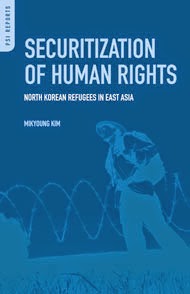As
the globalization process unfolds, human rights concerns have emerged as a
major variable in international interactions. The fashionable buzz words such
as human security, humanitarian intervention, life security, and securitization
of non-traditional security issues point to a gradual shift of focus from
Hobbesian guns-and-bullets paradigm to Kantian moral-ethical interests. The
general trend in Northeast Asia is, though, still preoccupied with national
security priority over human rights protection. Here we have the North
Korean problem confabulated with nuclear threats and human rights abuses.
The
summary execution of Jang Sung-taek, the current North Korean leader Kim
Jung-un’s relative and patron, on December 12, 2013 alerted to the systematic
human rights violations which did not evade the highest echelon of Pyongyang’s
ruling strata. It took only four days for the regime to execute Jang since his
arrest on December 8 of that year. The expeditious execution implies the denial
of defendant’s rights to attorney and total dismissal of legally stipulated
procedures. This high profile case supports the existing testimonies of North
Korean refugees on the arbitrary and summary executions in the totalitarian
regime.
North Korea acknowledges universality of
human rights, while advocating “socialist democracy” and “our theory of human
rights.” The contradictions lie in the obvious gap between rhetorical claims as
stated in the DPRK Constitution and empirical reality as testified by
the refugees. One of the
challenges in North Korean human rights lies with the fact that the Pyongyang
regime is the violator as well as the potential protector of the rights. The
concerned parties of international community, therefore, have to tread the
precarious waters in inducing the North Korean government’s cooperation to
abide by rule of law, while trying not further push it to a self-isolating,
defensive corner.
Making it more challenging, North Korea sees
human rights not as a norm to protect, but a politically
motivated pressure
tool. The regime calls for self-vigilance in facing the criticisms raised and
voiced by the international community. The Pyongyang leadership dismisses the
concerned voices of the “imperial powers” as unjustifiable interference into
domestic affairs. North Korea’s self-perception as the weak surrounded by the
hostile and powerful nations makes it ever more conscious of slight
belittlement, imagined or real, of its sovereignty. The human rights violations add more complexity to the
existing ‘North Korean problem’ where its primary concern lies
with nuclear capability.
Pyongyang’s aversion to the human rights
discourse originates from two primary reasons: overriding prerogatives to
maintain a domestic ruling hierarchy and the suspicions towards Western-centric
rights discourse. The world order perceived by North Korea derives from a struggle
between the imperialists and the subjugated. The two exemplary imperialist
countries in their perception are the U.S. and Japan, whilst member nations of
the opposing camp which they identify with include Cuba, Egypt, and Indonesia. This simple dichotomy of ‘with us vs.
against us’ are often demonstrated
at the United Nations Human Rights Council
sessions. On March 25, 2010, for example, North Korea refused to accept the Council’s
final resolution by stating that it will either “take note of” or “reject” the
117 recommendations.
The
advancement of human rights is a noble enterprise. As democracy aims to amend
the unequal distribution of power, universal rights is to respect the innate
humanity of all regardless of external attributes. Human rights discourse in
this regard can be both empowering and potentially subversive. The tension
between heightened awareness and the tenacity of ancient regime explains one of
the challenges of the 21st-century global society where North Korea
raises concerns for its unique challenges.
Mikyoung Kim is Associate Professor at Hiroshima City University-Hiroshima.
She was a Fulbright visiting professor at Portland State
University, OR, and served with the U.S. State Department at the U.S. Embassy
in Seoul, Korea, as a public diplomacy specialist. She has published many
articles on memory, human rights, and gender in Northeast Asia, and is the
author of Securitization of Human Rights:North Korean Refugees in East Asia (Praeger Security International, 2012).


No comments:
Post a Comment